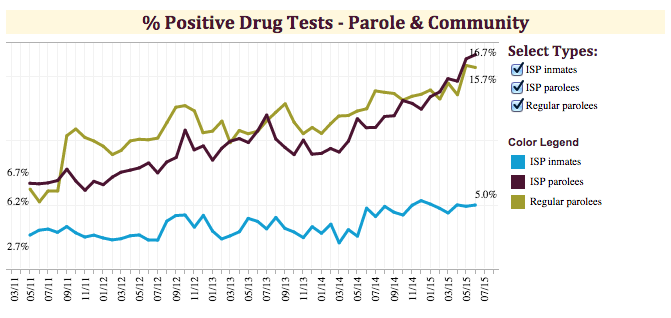For the Colorado Department of Corrections (DOC), the percentage of positive drug tests has risen steadily since 2011 in the three major categories measured: regular parolees, parolees under intensive supervision, and for prisoners under intense supervision.*
In May 2011, the rate of positive drug tests for parolees under intense supervision (ISP) was 6.7 percent. By June of this year, that number had risen to 16.7 percent.
Using the same time period, the share of positive drug tests for regular parolees went from 6.2 to 15.7 percent.

An unnamed person in the parole division provided the following comment to Complete Colorado via Adrienne Jacobson, the DOC’s spokeswoman:
(Department of Corrections Director Rick) Raemisch has been quoted as praising the dedication and professionalism of our community parole officers in adopting new practices to work with parolees for successful supervision and outcomes. Revocation removes a parolee from his family, his work, housing for a short period of time; 90-180 days. The period of revocation does not improve the offender’s opportunities for successful re-entry; therefore working to safely keep the offender in the community is the division’s focus. An increase in UAs should not result in a direct increase in revocations, but appropriate intermediate sanctions that address the issue such as medicated assisted therapy, increasing substance abuse treatment or inpatient treatment.
At least to the naked eye, legal marijuana would certainly appear to have contributed to the problem in some degree. Looking at the graph, the increase in positive drug tests is steady from 2011 to 2014, but the rate of increase accelerates after January 2014 when marijuana became legal.
Very few divisions in state government have experienced as much turmoil as the Department of Corrections, and especially, the Division of Parole, with most of that turmoil coming in the wake of the murder of DOC Director Tom Clements in the spring of 2013. Clements was murdered by Evan Ebel, a parolee who had slipped off his ankle monitor at least five days prior, according to this report by the Denver Post.
The revelations about Ebel set off a year of intense media scrutiny for the DOC, and the parole unit.
More recently, however, the state employees union, Colorado WINS, has eyed parole officers as potential union converts by harvesting dissatisfaction within the ranks.
Additionally, in March of this year, Complete Colorado reported that the parole director hired in early 2014 following the Clements tragedy barely lasted one year, leaving for a lower paying job in Illinois.
*Source – Department of Corrections “dashboard” statistics, https://www.colorado.gov/pacific/cdoc/departmental-reports-and-statistics
Send us tips at CompleteColorado@gmail.com.


